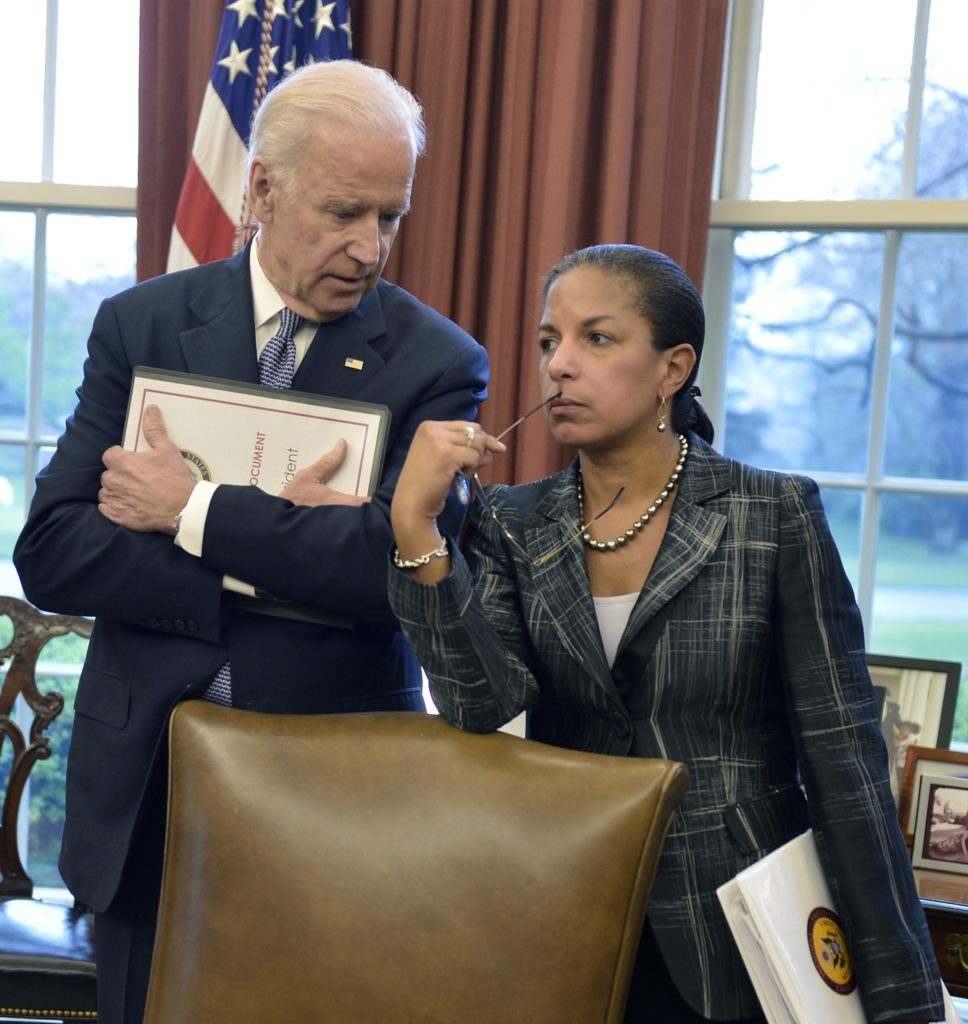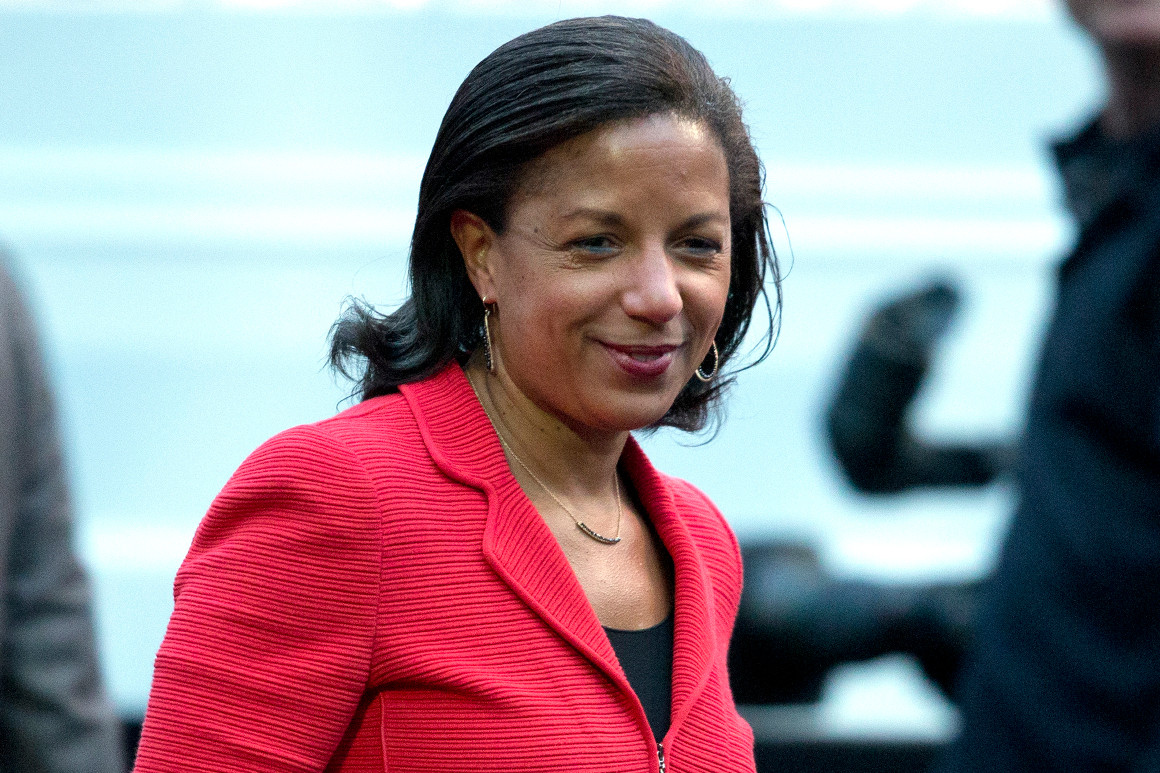 Getty Images
Getty Images WASHINGTON – APRIL 14: U.S. Vice President Joe Biden (L) and National Security Advisor Susan Rice talk as U.S. President Barack Obama and Iraqi Prime Minister Haider al-Abadi brief the press after a bilateral meeting in the Oval Office of the White House April 14, 2015 in Washington, DC. The two reportedly talked about supporting the fight against ISIS, a strategic partnership and relaltions in commercial and cultural interests. (Photo by Mike Theiler -Pool/Getty Images)
As America crawls toward the November 3 General Election, there is plenty of speculation, including prognostication, about who former vice-president and presumptive Democratic nominee Joe Biden will pick as his running mate.
First, some context. Perhaps you are not a political junkie, you are just a layperson or an average Joe and may be wondering why this should concern you. Whatever your station in life, we all have in stake in who becomes not just President of America, but Vice-President as well. Remember that when things don’t go well in America, everyone is impacted. There are ripple effects of decisions that get made in Washington, good or bad. Hear me now: Everyone needs to pay attention to what’s going on!
Even more important, my focus on U.S. politics always centers on what dividends it pays to the African continent. If you noticed, the continent has never been more important than now in shaping global economic growth and development. Think about the damages which Covid-19 has wrought on economies around the world, including those within the 54-nation African continent. Projections from the International Monetary Fund and the World Bank tell us that economic growth in the continent will shrink from 2.4% in 2019 to -2.1% and -5.1% in 2020 if measures taken to mitigate the strain are not successful. Imagine the consequences! Yet the continent remains a pivotal place for raw materials, business, and investments totaling more than $1.5 trillion, according to the World Bank.
So, no one, including the U.S., Russia, China, India, and other global powers, can afford to ignore it. This writing by Caleb Slayton: AFRICA: THE FIRST U.S. CASUALTY OF THE NEW INFORMATION WARFARE AGAINST CHINA, is a great starting point for anyone who wants to understand what is going on between America and China in Africa.
As a matter of fact, the biggest geopolitical battle taking place today, albeit unnoticed by a lot of people, is not the trade war between America and China. It is the silent, proxy war, between America, China, and Russia, taking place in the African continent. The predatory practices, exploitation, and to some level, positive economic benefits that foreign powers bring to the bargaining table, demand real scrutiny. African nations owe China a whopping $140 billion, while many are trapped in poverty. Some of them are now begging for debt forgiveness because the debt is causing instability, especially amid the coronavirus pandemic.
Analysts, governments, and international organizations around the world, including news media, have looked into this and written about it substantively. Others have simply brushed the matter aside. But it remains super-important. This is why the centerpiece of the Trump administration’s Africa policy, Prosper Africa, while it feigned an economic approach, was designed to simply counter America’s adversaries, China and Russia, in Africa. But they waited until it was too late to engage the continent in meaningful ways.
While Prosper Africa is an abject failure, there are those in the administration such as Tibor Nagy, current Assistant Secretary of State for African Affairs at the State Department who continue to tout a successful U.S.-Africa policy. Even the name Prosper Africa itself smacks of neo-colonialist tendencies, the sort of paternalistic attitude which makes the continent and its people appear like beggars in the eyes of the world. Whoever came up with the name, if they have not already been fired by Trump, ought to be fired right away.
There is a counter-argument about U.S. success in Africa under Trump. Writing for World Politics Review in January and commenting about a downsized U.S. relationship with the continent, Howard French states:
“According to the traditional rules of diplomacy, a country shows its commitment to foreign partners by servicing the relationship. When a relationship is healthy and constructive, this means frequent, high-level contacts. China has made a priority in its relations with the African continent in this century. It is not just a matter of fast growth in trade and investment, but can be readily seen in the way Beijing has serviced its African relationships.”
Views about America around the world, while generally favorable in some countries, have been greatly impacted by how current leader Trump is viewed, according to this Pew Research Center study released in January.
Please check out my previous writings on this matter
Now back to the selection process for who Biden might pick as his running mate. Susan Rice is one of several black women being considered by Biden to be his running mate. The negotiations, vetting process as they call it, are underway. I won’t dwell much on what each of the other women, long list, being considered can bring to the table. That’s for others to consider. For all who are vying for the job, I believe they all have the qualifications and they’ll do a better job than the current occupant of the White House.
By the way, the other three women said to be at the top of Biden’s shortlist are Congresswoman Val Demings from Florida, Senator Kamala Harris of California, and Congresswoman Karen Bass from California. Bass is the current chair of the Congressional Black Caucus. Her legislative and negotiation skills, especially in peacebuilding, reaching out across the aisle, meaning you still talk to and love your enemies, even when you disagree with them, have been touted much. Bass led a Congressional delegation to Cameroon in June 2019 to the nation of Cameroon which is the subject of fighting between Anglophone separatist movements and the government in Yaounde. Some of the oddsmakers have narrowed the odds down to a race between Harris and Rice.
As I’ve been paying attention to the punditry around this subject and based on my own observations, there are a few things about Rice that struck me. Following the publication of her book, Tough Love: My Story of the Things Worth Fighting For, and the many interviews granted to the media, I noticed that she is tough, that she is a public servant and someone who is highly experienced. The Democratic strategist, Van Jones recently remarked that she is the most qualified of all the women seeking the job. This, despite the fact that she has never run for political office.
By itself, this may not land her the job. The selection process itself is highly political. The final decision could go in a hundred directions.
Rice’s Foreign Policy Chops May Boost Her Chances
A lot of analysts have talked about the great working relationship which Rice has with Biden, something needed to forge ahead in a unified fashion. That is good. But I think there are plenty of other qualities she has which can be helpful in any good leadership and the legislative process. That is the ability to express differences of opinion without being disagreeable.
The U.S. Congress is often the subject of much ridicule because, as we have heard and seen, politicians often disagree to the point where they become disagreeable. And then we begin to see and hear them throw insults at each other, characterized by plenty of back and forth. Just look at President Trump.
While Rice has been accused of throwing so-called temper tantrums, I still find her public persona enjoyable, respectable, intelligent, and more importantly, geared toward the greater good of America and the world. There are plenty of people rooting for both Rice, as well as for Harris and Bass.
The special bond which Rice has with the motherland, not just as a black woman of African ancestry, but someone who has an established relationship with its people is a plus to me. America needs a strong African continent today more than ever before. The African continent needs a strong America too! Under the Trump administration, it seems, that a special bond has been broken.
We are told she became assistant secretary of state for African affairs, under President Bill Clinton, at age 32. To me that is remarkable. She is a former Rhodes Scholar, spent time at the much-respected Brookings Institution as a researcher, became U.S. Ambassador to the United Nations, and later National Security Adviser under President Obama. Writing for CNN, Jen Psaki, a former State Department spokeswoman credited Rice with helping prevent the 2014 Ebola epidemic from becoming a broader global pandemic.
But it’s even more interesting to look back at her time at the State Department under former Secretary of State Madeleine Albright. One criticism I have read is that while she was an assistant secretary of state, the Bill Clinton administration’s own failures may have contributed to the brutal massacre that occurred under her watch during the 1994 genocide in Rwanda. Also, she’s been criticized for her embrace of problematic African leaders, at the time, such as Rwanda’s President Paul Kagame and the late President Meles Zenawi of Ethiopia.
Rice has acknowledged some past mistakes, including missteps about the Benghazi, Libya situation in 2012, which she said were directly not of her own making. For sure, Republicans are going to seize on this. But it is not a point for disqualification. She is also not a Sarah Palin by any measure. Does anyone still remember her? On the contrary, Rice is a public servant, ready to lead in the twinkle of an eye.
Rice may lack U.S. domestic policy credos, a criticism advanced by Harold Mayerson at the American Prospect. But the one thing I believe she has is the skill set needed to lead. She has already proven so on foreign policy matters. America’s international reputation has been shredded by Trump, who had zero domestic or foreign policy credentials when he became president. Maybe a part of the Biden administration’s first 100 days in office would be to dispatch Rice around the world to clean up the huge mess created by the Trump administration.
Leadership, whether in domestic or foreign policy matters is learned. When Mitt Romney, the Republican candidate for President selected Paul Ryan to be his running mate in 2012, it was not because Ryan knew everything. As a matter of fact, what was hailed as a dream team at the time went on to experience defeat in November of the same year. Even President Obama himself, when he first ran for President in 2008, was only a freshman senator. Today he is considered one of the most successful American presidents in history.

